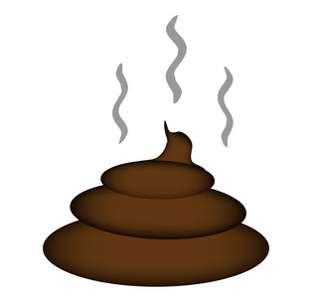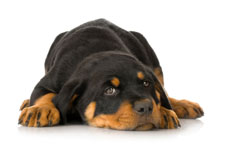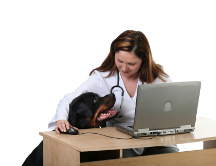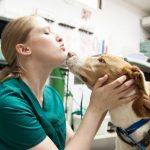Dog diarrhea (spelled in the UK as ‘diarrhoea’) is going to happen, it’s just a fact of life when you’re a dog owner.
In This Article You Will Read About

Loose stools in puppies and dogs are extremely common.
They can be caused by something simple such as a sudden change in diet or stress, or they can be a symptom of any number of dog diseases.
Diarrhea in dogs can be mild and short-lived, or it can start out severe – and rapidly get worse.
Loose bowels that last for longer than a day, especially if they’re accompanied by other signs of illness such as vomiting and/or lethargy, need to be evaluated by a veterinarian quickly.
Some very serious dog illnesses have diarrhea as a primary (and often the first) symptom.
But, even when the cause of the loose stools is simple (you changed your dog’s food or he snacked from the cat litter box), the dehydration it can cause can be a serious health concern in itself.
Knowing how to tell if you can afford to ‘wait and see’ for a day, or whether you need to visit a vet immediatlely, can make all the difference to your dogs’ health.
On this page I’ll help you figure out what’s caused your dog to have ‘the squirts’, and decide what the best course of action is – whether that’s simple at-home treatment measures, or a trip to the veterinarian’s office.
Common Causes Of Dog Diarrhea
Diarrhea in puppies and dogs comes in a variety of types, none of them pleasant but some more worrisome than others.
Here’s a look at the most common ones…
‘New Puppy Syndrome’
Young puppies very often have an episode, or two, of diarrhea or loose stools, during their first week or two in a new home.
A sudden change in diet, coupled with the stress of leaving their ‘doggie’ family and moving to a new home, causes an upset tummy and the resulting loose bowels.
In this situation, the puppy diarrhea usually ranges from ‘loosely-formed’ stools to a soft ‘chocolate pudding’ type consistency.
If your pup is still eating and drinking normally, isn’t vomiting or showing signs of exhaustion and plays happily, the chances are good that the problem will resolve itself within a day or two.

You can often prevent this from happening in the first place by making any dietary ‘change-overs’ gradually – slowly replacing the old ‘familiar’ food with the new one over a period of a week or so.
For this type of diarrhea all you really need to do is to make sure that your pup has access to plenty of fresh water, and gets plenty of rest.
BUT… if the diarrhea doesn’t get better within 24 – 48 hours, or it gets worse, or if your pup shows any signs of not feeling well, you’ll need to get him examined by your vet right away.
Dietary ‘Indiscretions’
Even if you haven’t changed your dogs’ food recently, he may have had the urge to eat something that isn’t part of his normal diet – or even considered edible!
A midnight ‘snack’ from the kitchen trash can, or eating half of your new leather loafers are pretty much bound to end in an upset tummy for your dog – and if you’re a new dog owner you may well be surprised at how creative your pet can be when it comes to experimenting.
Depending on exactly what was eaten, the resulting dog diarrhea can be anywhere from one loose stool, to several very ‘runny’ ones. Your dog may also vomit once or twice, and will probably look fairly sorry for himself.
It can be a bit tricky to figure out whether dog diarrhea like this is a minor or a major problem.
Unless you know for sure what your dog ate, and you know that it isn’t toxic to dogs and isn’t likely to cause an intestinal obstruction, I’d strongly suggest talking it over with your veterinarian.
A meal of left over burgers and fries isn’t likely to be an issue, but things such as the stuffing from the sofa pillows/pieces of a toy/stones from the back yard or the TV remote control all have the potential to cause serious trouble!
Some foodstuffs that are fine for humans can be dangerous for your dog. Chocolate is a big one… it only takes a little bit of chocolate to poison a dog. Check out this page for info. on that – Help! My Dog Ate Chocolate.
For a list of the most common foods that pose a danger to your dog, see this page… Poisonous Foods.
If your dog has diarrhea that is recurring or getting worse, is vomiting (or retching/trying to vomit), seems lethargic or is showing signs of stress such as excessive panting, drooling, whining, pacing and so on, then you need to have him seen by a veterinarian right away.
On the other hand, one or two loose stools (even if accompanied by one episode of vomiting) aren’t necessarily cause for panic, and if your dog is behaving normally in all other respects then you can probably ‘wait and see’ for 12 – 24 hours.
BUT (and this is a big BUT), if your dog shows any other signs of illness or distress, or you are at all worried – talk to your vet. It’s always better to be safe than sorry.
Illness or Disease
There are a whole host of different dog illnesses and canine health conditions that can cause diarrhea in dogs.

Some of them may be fairly minor, others can be deadly in a very short space of time.
Many of them are very common in puppies but although they may be less common in adult, vaccinated dogs, there is still the potential for harm.
Some of the most common causes of dog diarrhea in terms of illness or disease include:
- Parasitic diseases such as Coccidia or Giardia
- Canine worms
- Canine Parvovirus – Parvo in puppies is especially common.
- Other contagious dog diseases – Distemper, Coronavirus, Hepatitis & more
- Canine Irritable Bowel Syndrome (IBS), Colitis or other digestive ailments
When disease is the root cause your dogs’ diarrhea, the diarrhea itself is generally more severe and is almost always accompanied by other signs of illness such as repeated vomiting, loss of appetite, lethargy, fever and so on.
Although he may start out with just ‘loose’ stools, in this situation dog diarrhea will usually get progressively more severe (sometimes very quickly).
It often turns watery and may even contain streaks of blood or mucus. If this happens to your dog, he’ll probably look (and act) as though he feels terrible, and you’ll suspect that something is very wrong.
Aside from the effects of the underlying illness, the dog diarrhea itself will cause your dog to get dehydrated very rapidly.
If left untreated, dehydration causes serious health complications, even eventual organ failure, so if your dog has repeated episodes of diarrhea, isn’t drinking enough or won’t/can’t keep water down, he needs to be seen by a vet immediately.
Because dog diarrhea is a symptom seen in so many canine diseases, I’d recommend always erring on the side of caution!
Don’t hesitate to get your veterinarians’ opinion if you’re at all concerned – it could make the difference between life and death.
Rottweilers & Parvovirus
Rottweilers are one of the breeds that are especially susceptible to Parvo (others include Doberman Pinschers, German Shepherds and Pitbull and bully breeds) , so you should never take chances with a puppy who’s repeated episodes of diarrhea and showing signs of illness.
Canine Parvovirus can literally kill a young puppy, within 24 hours. I’d strongly recommend checking out my Parvo Symptoms page so that you know what to look for and can keep your puppy safe.
Also, bear in mind that even fully vaccinated Rottweiler puppies have been known to catch this horrible virus and there Parvo strains that target older dogs too.
Because of all of this, ANY time a Rottweiler shows signs of illness, which include diarrhea, vomiting and lethargy, he needs to be seen by a veterinarian IMMEDIATELY.
Treating Diarrhea In Dogs
If your puppy or dog has severe, watery diarrhea, is showing any signs of feeling unewll, or is diarrhea has lasted for longer than 48 hours, you need to have him examined by your vet to find out what’s causing the problem.
There’s no two ways about it at that point. It’s always important to rule out something serious.
If your pooch has some loose-to-pudding-consistency stools but otherwise is acting normally, is eating and drinking normally, and seems happy, you can usually wait for 24 to 48 to see if things improve.
It’s always important to make sure a pup with loose bowels or diarrhea has plenty of fresh water.
Dehydration can cause all sorts of trouble, all by itself.
Here are a few tips that can help speed up the healing process:
Fasting
To give your dog’s tummy a chance to settle down, you can withhold food for 12 – 24 hours.
Small breeds and young puppies are better being fasted for just 12 hours. Medium to large adult dogs can be fasted for 24 hours.
Don’t forget to make sure there’s plenty of water available at all times.
You can try to encourage additional fluid intake if by offering water flavored with a little chicken stock, or a product like K9 Quencher which is available in several tasty flavors.
If your pooch vomits up some foamy, yellow/green liquid it’s most likely going to be because his tummy is too empty. Giving him a couple of plain dog biscuits is okay to help with that.
After the fasting period is over, the first meal to feed your dog should be plain, white, boiled rice. With a tablespoon of canned pumpkin (not the pie-filling variety) added.
This is bland, easy to digest food, and will hopefully reset his digestive system.
After two meals of this, you can gradually return him to his normal dog/puppy food.
Dietary Changes
Adding a little canned pumpkin or pureed sweet potato to your pups food can help firm up stools (oddly enough, it can also help a constipated puppy!)
To prevent loose stools as a result of a sudden change in diet, if you want to change puppy or dog foods, do it s-l-o-w-l-y.
If you start out by adding just a handful of the new food to the current one, then gradually increase the amount of ‘new’ and decrease the amount of ‘old’ over a few days time, upset tummies are much less likely.
High protein dog foods are can cause loose stools in some dogs. As can generic or low quality foods which contain a lot of chemicals, poorly absorbed nutrients and ‘fillers’.
Large breed puppies shouldn’t eat food with high levels of protein as it can cause problems with their growing bones joints (see my Feeding Puppies page for more on this).
Supplements & Products For Dog Diarrhea
There’s a whole range of different dietary supplements and products that have been especially designed to help dog diarrhea and digestive upsets.
Here’s a look at some of the best ones on the market
Final Thoughts
Overall, a mild or short-lived bout of diarrhea in dogs is very common and generally nothing to be too worried about.
BUT diarrhea which is watery, contains mucus or blood, or is extremely smelly, needs veterinary evaluation right away.
Even mild diarrhea needs to be checked out by your vet if it lasts more than 12 – 24 hours.









